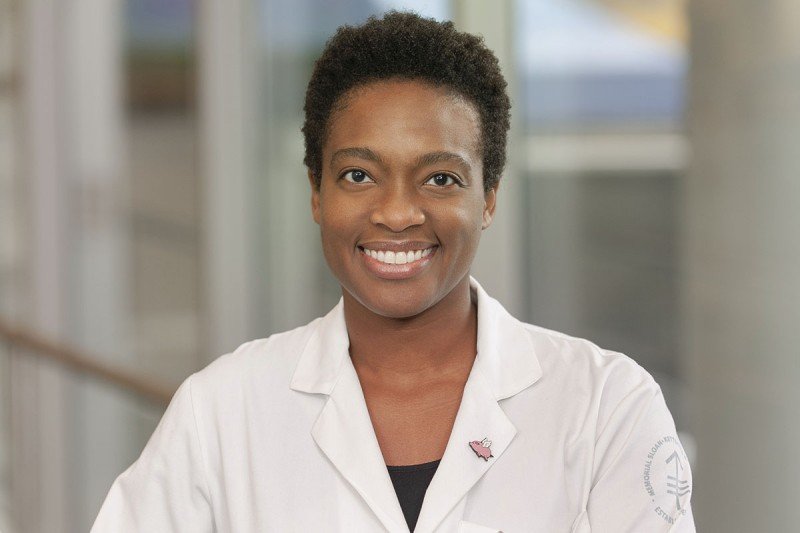
Monique James helps patients who have psychiatric co-morbidities and breast cancer.
In 2017, Monique James, MD joined the Department of Psychiatry and Behavioral Sciences at Memorial Sloan Kettering Cancer Center (MSK), but her journey with MSK started 18 years before she even started medical school.
“I worked as a session assistant — when they were called session assistants! — in the urology surgical oncology group at Kimmel Center from 2004 to 2005,” she says. “I was a floating session assistant and got to work with several of the surgeons who were very kind to me for a myriad of reasons, but particularly because they knew I was interested in going to medical school,” she adds.
Growing Up
Dr. James’ mother is from the small Caribbean island of Monserrat and her father was raised in Miami, where Dr. James was born. Her parents met and lived for many years at Point Park University, a small college in Pittsburgh, Pennsylvania, before returning to Miami to raise Dr. James and her two older brothers.
“I still consider Miami my home,” says Dr. James, sharing that the joys of visiting her parents, family, and friends who still live there is a big part of who she is today.
“Miami is a melting pot of the Caribbean diaspora,” she adds, and credits her family for incorporating Afro-Caribbean traditions and strong ties to religion while she was growing up in Miami, explaining that both have played a significant role in her identity as a Black woman. Dr. James adds: “Understanding several different socioeconomic, educational, and other demographics in my fellow man encourages me to embrace humanity.”
Dr. James’ mother’s work as an educator also inspired her lifelong passion for learning. “My own education and the ability to teach others was instilled in me from childhood. Education can open up worlds, sometimes more than a plane ticket,” says Dr. James.
From an early age, Dr. James was interested in medical pursuits. “I was fascinated by academics, science, and the human body and how they shape our lives and interactions,” she explains. “I was very inquisitive and read a lot growing up.” Dr. James took on different roles throughout her life, from the quiet child to the caregiver, which helped mold her personal and professional interests.
Medical School and MSK
Dr. James eventually left Miami for Massachusetts and graduated from Harvard with a major in biological anthropology before completing a Pre-Medical post-baccalaureate program at The University of Pennsylvania. After two years as a session assistant at MSK, she attended medical school at Case Western Reserve University in Cleveland and completed the Adult Psychiatry residency program at The University of California, San Francisco. Dr. James then spent time working as an attending psychiatrist in California before returning to MSK as a Consult Liaison Psychiatry Fellow. She joined the Department of Psychiatry and Behavioral Sciences soon after.
As part of the Breast Cancer Disease Management team, she splits her clinical time between hospital rounds at MSK, the MSK Counseling Center, and the Breast Center of MSK to treat breast cancer patients.
“Our focus is on helping patients who may have psychiatric co-morbidities and helping our Psychiatric colleagues in managing their patient caseloads,” says Dr. James. She is also involved in several quality improvement projects and other initiatives, and is a member of the MSK Clinical Council. As a member of the Ethics Consultation Service, she consults with staff and patients on various ethical questions and issues. Patients and family members now have the option to request ethics consults with the Ethics Team directly from their MSK MyChart Patient Portal.
Black History Month
Dr. James expresses how important it is for all of us to take care of ourselves. She often refers to a principle in psychology that boils down to: Take care of your future self with the decisions you make today. She says: “It is important to ensure that you have mental health care, good nutrition, and access to good medical care today, because it will help you tomorrow.” She reflected on this tenet when asked how she dealt with the challenges of the past year.
“Coupled with my faith, being in therapy, and prioritizing my own mental health so that I can help others with theirs helps me create a narrative of this world which helps me not feel alone,” Dr. James says.
“There is beauty all around us, even in the turmoil of these past years. It is a balance between exercising gratitude, but also acknowledging the sadness that comes with being on the receiving end of challenges,” she shares.
Final Thoughts
“Black History Month is a celebration of the people who have contributed so much to the development of what makes our country what it is,” says Dr. James. She adds that there are many ways to honor the ancestors who forged the path for people who look like her to walk on, but whose efforts improved the path for everyone else too. From the literal and figurative building of communities, to culture, to highlighting the importance of equity and access to opportunities, to teamwork and so much more.
“The hope is that celebrating and highlighting those who have been marginalized in the past, and who continue to be marginalized today, is seen as an important experience for all members of our society,” she says.
“Black people are an integral part of society in all its forms,” she continues. “It’s important to recognize that we are not a monolith since there are so many beautiful and unique aspects to the African Diaspora. Black history is all of our histories!”


